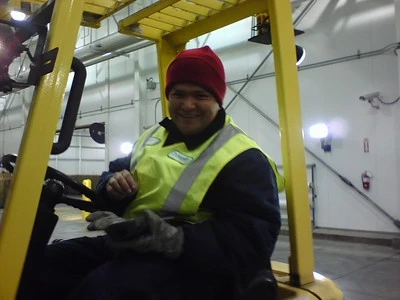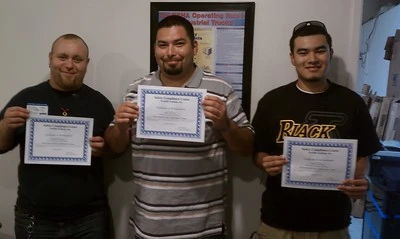How to Get a Forklift License in Arkansas (2024)?
May 31, 2024 | by onlineoshasafetytraining.com


Getting a forklift license in Arkansas is an essential step if you want to work with forklifts safely and legally. It opens up more job opportunities and ensures you know how to handle these machines properly.
In this guide, we’ll walk you through everything you need to know about getting your forklift license, from the requirements and training to the costs and renewal process. Whether you’re just starting or looking to advance your career, this guide will help you get on the right track.
Understanding the Requirements
Before you can get a forklift license, there are a few basic requirements you need to meet:
- Age Requirement:
- You must be at least 18 years old. This is because operating a forklift involves significant responsibility and potential hazards, and individuals under 18 are generally considered not mature enough to handle these safely.
- Physical and Mental Fitness:
- Good Vision: You need to see clearly to navigate the forklift and spot potential hazards. This includes both near and far vision.
- Good Hearing: Being able to hear alarms, warnings, and verbal instructions is crucial for safety.
- Coordination: You must have good hand-eye coordination to control the forklift smoothly and accurately.
- Mental Alertness: Operating a forklift requires constant attention and the ability to make quick decisions, so being mentally sharp is essential.
- Basic Literacy and Comprehension Skills:
- Reading: You should be able to read safety signs, operation manuals, and instructions clearly.
- Writing: Being able to fill out checklists and reports is often required.
- Understanding English: Since most training programs and safety materials are in English, you need to understand it well enough to follow along and apply the instructions.
Types of Forklift Licenses
Specific Licenses for Different Types of Forklifts
Depending on the class of forklift you will be operating, you might need a specific license or certification. Here’s a breakdown:
- Class I: Electric Motor Rider Trucks
- Training Focus: Emphasis on battery maintenance, charging procedures, and the unique handling characteristics of electric forklifts.
- Certification: Covers safe operation in indoor environments, proper use of attachments, and handling different types of loads.
- Class II: Electric Motor Narrow Aisle Trucks
- Training Focus: Specialized in maneuvering in tight spaces, understanding the specific controls and features of narrow aisle forklifts.
- Certification: Ensures operators can safely navigate narrow aisles, prevent tipping, and manage load stability.
- Class III: Electric Motor Hand Trucks or Hand/Rider Trucks
- Training Focus: Focuses on pedestrian-operated forklifts, such as pallet jacks and walkie stackers, with an emphasis on safe handling and lifting techniques.
- Certification: Includes practical training on operating the forklift while walking or riding, load balancing, and safe stacking.
- Class IV: Internal Combustion Engine Trucks with Cushion Tires
- Training Focus: Involves understanding the operation of internal combustion engines, safe refueling practices, and handling smooth surfaces.
- Certification: Covers safe operation in indoor settings, maneuvering in confined spaces, and proper maintenance of the forklift.
- Class V: Internal Combustion Engine Trucks with Pneumatic Tires
- Training Focus: Focuses on the dual capability of these forklifts to operate both indoors and outdoors, including rough terrain handling.
- Certification: Ensures operators can manage rough surfaces, understand tire maintenance, and operate safely in varying environments.
- Class VI: Electric and Internal Combustion Engine Tractors
- Training Focus: Emphasis on towing techniques, hitching and unhitching procedures, and safe operation for towing heavy loads.
- Certification: Includes training on the specific requirements for towing operations, managing different types of loads, and ensuring safe towing practices.
- Class VII: Rough Terrain Forklift Trucks
- Training Focus: Specialized in handling rough and uneven surfaces, understanding the unique stability issues, and operating in outdoor environments.
- Certification: Covers safe operation on construction sites, proper load handling on uneven ground, and maintaining stability and control in challenging conditions.
Importance of Specific Training
It’s crucial to get the right training for the specific type of forklift you’ll be using because each class has its own unique operational techniques and safety protocols. Proper training ensures that you:
- Understand the Equipment: Know the specific controls, features, and maintenance needs of the forklift you’re operating.
- Handle Loads Safely: Learn how to balance, lift, and transport loads safely to prevent accidents.
- Navigate Environments: Gain skills to maneuver the forklift in different settings, whether it’s a narrow aisle, a rough terrain site, or an indoor warehouse.
- Follow Safety Protocols: Adhere to safety guidelines specific to the forklift class, reducing the risk of injuries and accidents.
Steps to Obtain a Forklift License in Arkansas
Getting a forklift license involves several key steps to ensure you are properly trained and certified to operate a forklift safely. Here’s a detailed guide:
1. Find a Training Program
- List of Accredited Training Schools in Arkansas:

- Look for schools and training centers that are accredited and recognized by OSHA or other relevant authorities. Some well-known training providers include community colleges, vocational schools, and specialized forklift training centers.
- Examples might include Arkansas State University, Pulaski Technical College, and other local technical institutes. See the list below.
- Online vs. In-Person Training Options:
- Online Training: Some programs offer online classroom instruction for the theoretical parts of the training. This can be convenient if you have a busy schedule or prefer to learn at your own pace.
- In-Person Training: Includes hands-on training which is essential for learning how to operate a forklift practically. This part of the training must be done in person to gain real-world experience.
2. Complete the Training Program
- Classroom Instruction:
- Safety Rules: Learn about OSHA regulations, workplace safety standards, and the importance of adhering to safety protocols.
- Operational Guidelines: Understand the basic operations of a forklift, including controls, starting and stopping procedures, and proper handling techniques.
- Hands-On Training:
- Maneuvering: Practice driving the forklift in various conditions, learning how to steer, navigate tight spaces, and operate on different surfaces.
- Loading/Unloading: Gain experience in lifting, stacking, and transporting loads safely, understanding the importance of load stability.
- Maintenance: Learn routine maintenance tasks such as checking fluid levels, inspecting tires, and ensuring the forklift is in good working condition.
3. Pass the Written Test
- Topics Covered in the Test:
- OSHA regulations and safety standards.
- Forklift operations and controls.
- Load handling and stability principles.
- Emergency procedures and accident prevention.
- Tips for Preparing for the Written Exam:
- Study the training materials provided during the classroom instruction.
- Take practice tests if available to familiarize yourself with the format and types of questions.
- Focus on key safety rules and operational guidelines.
4. Pass the Practical Test
- What to Expect During the Practical Test:
- You will be tested on your ability to operate a forklift safely and efficiently.
- The test will include tasks such as driving the forklift through an obstacle course, lifting and moving loads, and performing routine maintenance checks.
- Common Mistakes to Avoid:
- Not Following Safety Procedures: Always wear the necessary protective gear and follow all safety protocols.
- Improper Load Handling: Ensure loads are balanced and secure before moving.
- Poor Maneuvering: Take your time to navigate obstacles and tight spaces carefully.
- Neglecting Maintenance Checks: Always perform a pre-operation inspection of the forklift.
By following these steps and ensuring you complete each part of the training and testing process, you can obtain your forklift license and be well-prepared to operate a forklift safely and effectively.
Forklift Training Providers in Arkansas
Here are some additional forklift training providers in Arkansas along with their contact information and addresses:
| Training Provider | Contact Info | Address |
|---|---|---|
| University of Arkansas Community College – Hope/Texarkana (UAHT) | Email: racie.poindexter@uaht.edu Phone: (870) 722-8274 |
2500 South Main, Hope, AR 71801 |
| The Lilly Company | Phone: (888) 735-9860 | 8801 Frazier Pike, Little Rock, AR 72206 |
| Goodwill Industries of Arkansas | Phone: (501) 372-5100 | 7400 Scott Hamilton Drive, Suite 50, Little Rock, AR 72209 |
| Arkansas JobLink | Email: ajl.help@arkansas.gov | 2 Capitol Mall, Little Rock, AR 72201 |
| National Lift of Arkansas | Phone: (501) 490-0909 (Little Rock) Phone: (479) 717-2535 (Springdale) |
601 West Dixon Road, Little Rock, AR 72206 228 South 40th Street, Suite B, Springdale, AR |
| All Purpose Forklift Training | Phone: (888) 978-2516 | – |
Cost of Getting a Forklift License

The cost of getting a forklift license can vary, but generally, you can expect to spend between $150 to $500 for the training program. This price depends on where you take the training and whether you choose an online or in-person course. Some programs might include the exam fees in their total cost, but if they don’t, you’ll need to pay an additional $50 to $100 for the written and practical exams.
If the cost seems high, there are ways to get help. Some training schools offer financial aid or payment plans, allowing you to pay over time rather than all at once. Additionally, if you are already working, ask your employer if they have any programs to help with the cost. Many companies are willing to pay for or reimburse employees for getting their forklift license, as it benefits both the employee and the employer by ensuring safe and efficient operations.
Renewing and Maintaining Your Forklift License
Your forklift license is usually good for three years. After that, you need to renew it to keep driving forklifts legally.
To renew your license, you’ll need to take a refresher course, which goes over important safety rules and how to operate the forklift. After the course, you’ll also need to pass a practical test to show you can still handle the forklift safely.
Sometimes, your employer might ask you to take additional courses even before your license expires. These courses help you stay up-to-date with new safety rules and any changes in how forklifts are used. This way, you’re always ready to operate the forklift safely.
Salary of Forklift Operators Working in This State
The average salary for a forklift operator in Arkansas in 2024 is about $36,360 per year. If you are just starting, you can expect to make around $28,170 a year. For those with more experience, the pay can go up to $48,380 a year. On an hourly basis, forklift operators usually make between $14 and $22 per hour, with the average being about $17.28 per hour.
These numbers can vary depending on your experience, the company you work for, and the specific job duties you have. For example, mid-level forklift operators earn around $36,360 annually, while those with more senior experience can make about $38,750 per year. Additionally, some reports indicate that forklift operators can earn an average of $16.97 per hour plus overtime pay, which can add up to an extra $5,437 annually.
Job Outlook for Forklift Operators in Arkansas
The job outlook for forklift operators in Arkansas looks good. Here’s why:
Growing Industries

- Manufacturing and Distribution: Big companies like Tyson Foods, J.B. Hunt, and Riceland Foods are based in Arkansas and they need a lot of forklift operators to keep their warehouses running smoothly.
- Retail Expansion: Major retailers such as Walmart and Amazon are expanding their distribution centers in Arkansas, which means more jobs for forklift operators.
Employment Growth
- Steady Demand: The demand for forklift operators is expected to grow by about 5% from 2021 to 2031, which is similar to the average growth rate for all jobs. This means there will be a steady need for forklift operators in Arkansas.
- Job Openings: There are always job openings for forklift operators listed on job search websites like Indeed and Arkansas JobLink, indicating ongoing demand.
Overall, if you have a forklift license, you can expect to find plenty of job opportunities in Arkansas. The steady demand, good pay, and importance of safety and new technology make it a solid career choice in the state.
To Make a Conclusion
Getting a forklift license in Arkansas is a straightforward process that can open up many job opportunities. By following the steps of finding a training program, completing both classroom and hands-on training, and passing the necessary tests, you can become a certified forklift operator. Remember to renew your license every three years and take refresher courses to stay updated on safety practices. With proper training and certification, you’ll be well-prepared to operate forklifts safely and effectively in various work environments.
RELATED POSTS
View all


